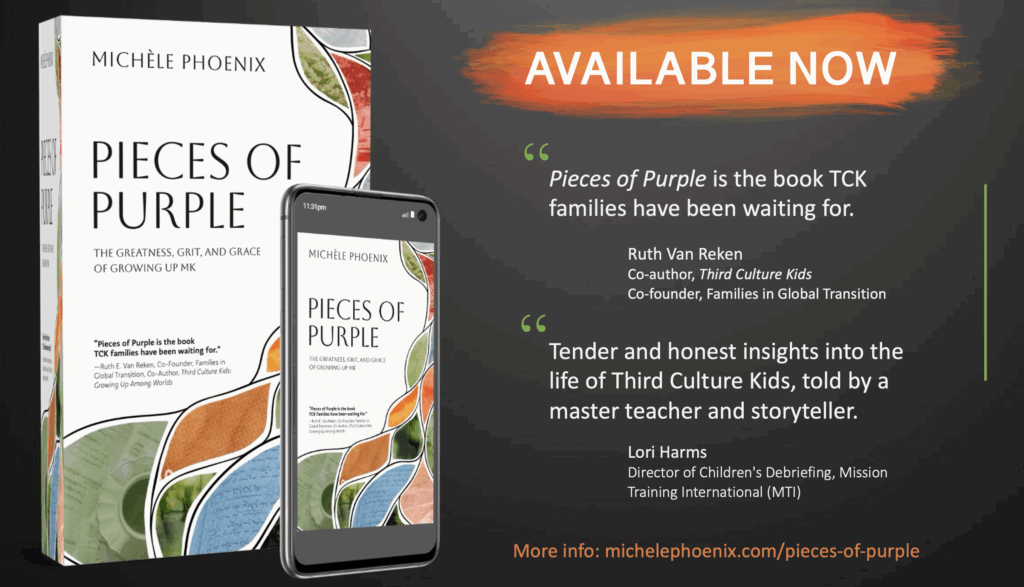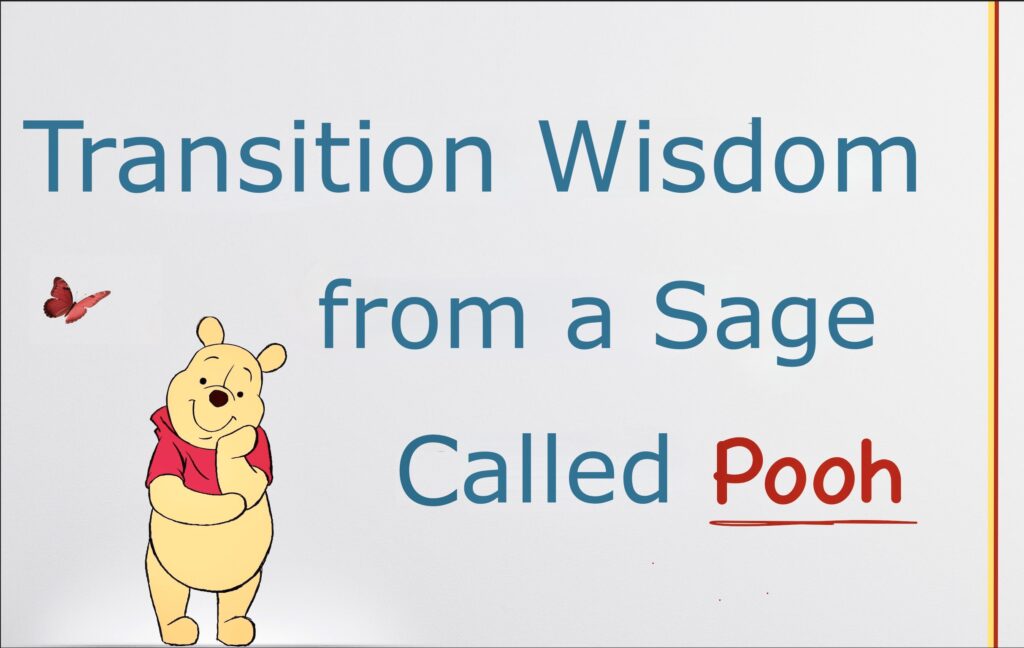New from Michèle Phoenix. Read more and order HERE.
[The audio version of this article is available on the Pondering Purple podcast.
Click HERE to listen or find it on your preferred podcast platform.]
Transitions are inevitable in the expat life. At best, they’re portals that can usher in change, adventure, and growth—and at their worst, resistance, resentment, and withering.
I’ve read the books, perused the articles, and listened to the podcasts. There are so many valuable insights about change to be gleaned from others on parallel journeys! But I’ve also found that there can be something powerful in learning from less conventional sources—sources that disarm our solely cerebral search for clarity and engage our imagination.
So this is by no means an academic thesis on the subject of transition. It’s a closer look at some of Winnie-the-Pooh’s honey-soaked wisdom about looking for light, forming foundations, and finding our friends. I’m fairly sure A. A. Milne would be surprised to see his bear’s words used in this unconventional exploration, yet I suspect that his beloved character was well acquainted with the topic—and I present this quote as irrefutable evidence: “I’m not lost for I know where I am. But however, where I am may be lost.” 1 A more accurate description of mid-change living has seldom been spoken!
[Note: though most of the quotes here are directly from A. A. Milne’s writing, several others are from adaptations. See footnotes for full list of sources.]
“I always get to where I’m going by walking away from where I’ve been.” 5
The obvious problem with moving to new places is that we’re forced to leave other places behind. The losses are huge, often measured in increments of “knownness” and “homeness.” Of relationships too—the kind that used to sustain and define us. There’s just no getting around the ache of those partings. Winnie said it best.“How lucky am I to have something that makes saying goodbye so hard.” 3
There’s a tension in those words. A challenge to cling to enough clarity as we say hard goodbyes that we can be thankful for what has been, even as we mourn it. Being able to frame our pain as both grief and gratitude doesn’t dull the ache, but it allows a gleam of something divine into its overwhelming grayness.
The mindset we bring to the impending leap can be helpful as well. Eeyore said, “It never hurts to keep looking for sunshine.” 6 And Piglet concurred, in his own squeaky way. “I wonder what’s going to happen exciting today?” 1
How wise they are. Intentionally turning our minds toward some form of hope, even as we grapple with daily new-world hurdles, can make the difference between resilience and defeat.
Winnie’s own words are a reminder to stay open to good things. “If it’s not Here, that means it’s out There.” 4 A conscious predisposition to expecting good things can be both an inoculation and an antidote for some of the hardships of transition. If we can keep looking for the silver linings—not only searching for them, but believing we’ll find them—we’ll be able to experience the seasons in which we feel disoriented or lost as passages that lead toward something good.
This isn’t to say that there isn’t value in sitting in the pocket of today. There is honesty and purpose in living squarely in the present, even as we remember yesterday’s challenges and anticipate the gifts that may still lie ahead. In Winnie’s words, “Today is my favorite day. Yesterday, when it was tomorrow, it was too much day for me.” 3 That’s a sweet way of saying, “Congratulations. You made it to yesterday’s tomorrow. And that’s no small achievement.”
When the toll of preparations, planning, and goodbye’ing bleeds into the current moment, reminding ourselves of how much we’ve overcome to reach the “now”—of the courage and grit that brought us to the new phase we’re beginning—can be a calming and strengthening thing.
Once the practical and logistical details of the move re behind us, reality sometimes sets in with a thud. We try to prepare ourselves so we can avoid huge mistakes, but there’s no escaping the occasional stumbles or cultural faux-pas.
“If possible, try to find a way to come downstairs that doesn’t involve going bump, bump, bump, on the back of your head.” 1
Those of us who have lived cross-culturally might be confident in the skills we’ve developed, but even those don’t make us stumble-proof. If we consider our missteps to be failures instead of giving ourselves grace, we’ll add shame to the already taxing task of transition.
Taking risks is good. Using our cross-cultural skills is great. And giving ourselves permission to not do things perfectly can be downright redemptive. After all, “What’s wrong with knowing what you know now and not knowing what you don’t know until later?” 4
Some “bump, bump, bumps” will be inevitable as we attempt to find stability while straddling worlds. But that’s not the end of the story. As owl put it, “If the string breaks, then we try another piece of string.” 1 Reaching for those new strings can feel messy and uncertain, sometimes even embarrassing, as transition-seasoned missionaries and MKs—but every bump is also a step forward.
And then there’s faith. There’s no overstating its value in our universe-hopping seasons. When it feels like the places, purposes, and people who were our foundation have been ripped away, the unchanging and ever-present nature of God is the most anchoring of truths.
Though our tendency, in those times, might be to focus less on faith because there’s simply so much to do as we adapt to a new life and environment, prioritizing spiritual nourishment can be a stabilizing gift to discombobulated emotions. As Winnie likes to say, “I’m never afraid when I’m with you.” 3 To be honest, “Never” feels too strong a word. At the risk of offending Pooh, my suggested edit would be: “I’m less afraid when I’m with you.” Given what I’ve learned about transition and faith, that feels just about right.
And then there’s the challenge of building new relationships. Even that can feel like it requires too much effort when we’re pouring out so much just to make it through the day. One of the most dangerous side-effects of transition is isolation—which in small doses might be healthy for people like me who so value aloneness. But when it becomes chronic, we lose the human connection designed by God for both fuel and healing.
Reaching out isn’t without risk, of course. How many of us have tried repeatedly to find a kindred spirit and either been rebuffed or ignored. After numerous failed attempts—or just from lack of social energy—we might find it so much easier to stop trying.
I understand that reticence. I’ve lived it. And I’m embarrassed to admit how often I’ve reached disparaging conclusions about the people around me in order to support my own inaction, labeling them shallow or self-centered for not responding the way I expected.
If only I’d had Winnie-the-Pooh as a mentor in those frustrating transitional phases. “If the person you are talking to doesn’t appear to be listening, be patient. It may simply be that he has a small piece of fluff in his ear.” 1 I’ve learned that that “fluff” could be all kinds of things that have nothing to do with my quick assessment of other people’s shortcomings.
Only time will determine which “Acquaintances of Unknown Status” will become the friends we’re hoping and praying for—the kind to whom we might say, “Being with you feel just right.” 6 The patience it requires to wait for that kindred soul might feel futile, and yet: “Rivers know this: there is no hurry. We shall get there some day.” 2 Because, after all, “Weeds are flowers too, once you get to know them.” 2
Along with patience, relationship-building will often require initiative—even in times when it feels like too much effort! But, “You can’t stay in your corner of the Forest waiting for others to come to you. You have to go to them sometimes.” 1
I frequently tell the MKs I work with that taking the initiative will look different for each of us. For extroverts, it might look like joining a club, crashing a party, or walking up to strangers and starting a conversation. To introverts like me, though—or to exhausted extroverts—it might just mean putting ourselves in places where connection could be possible and making sure we look available for someone else to speak to us. There are seasons when that’s all we have to give. And that’s okay.
There are no easy remedies for the discomfort and disruption of our biggest transitions. The challenges and sticking points will be unique to our temperaments and contexts, and the way forward dependent on so many variables.
But there is hope.
I encourage you to be honest in your own self-assessment. To use accurate words for the day-to-day stresses you’re feeling. To speak to others who have been there before you and let their “after picture” breathe some light into the hard place where you find yourself today. Learn from their mistakes and adjust their strategies to your situation. And even as you’re putting out that effort, bring your concerns to the God who cares and listens, because you’re not alone and his help and wisdom are just a prayer away.
And as you muddle through, remember this affirmation from one of our lesser prophets:“You’re braver than you believe, stronger than you seem, and smarter than you think.” 3 If you need a reference for that verse, you’ll find it First Christopher Robin, Chapter…something-or-bother.
Perhaps this quote from Charles Spurgeon is a more appropriate place to end. It’s been helpful to me: “The seasons change, and you change, but your Lord abides evermore the same, and the streams of His love are as deep, as broad, and as full as ever.”
To that, Winnie and I say a heartfelt, “Amen.”
•-•-•-•-•-•-
Quote sources:
-
-
- A. A. Milne’s Winnie the Pooh (1926)
- The House on Pooh Corner (1928)
- Pooh’s Grand Adventure (1999)
- The Tigger Movie (2000)
- Winnie-the-Pooh film (2011)
- Disney adaptations
-
- Contribute your thoughts in the comments section below.
- Use the social media links to Like and Share this article.
- Click this link to listen to this article in audio form on the Pondering Purple Podcast.
- Pick up Of Stillness and Storm (my novel about a missionary calling gone awry) on Amazon.
- Flecks of Gold, a coffee-table book that explores God’s presence in our suffering, is available only from this website. Follow this link to learn more about it.
- And don’t miss Pieces of Purple, a book the combines everything I’ve ever learned or taught about MKs in an accessible and clear format. Available from Amazon around the world.
- To subscribe to this blog, use the field below.






